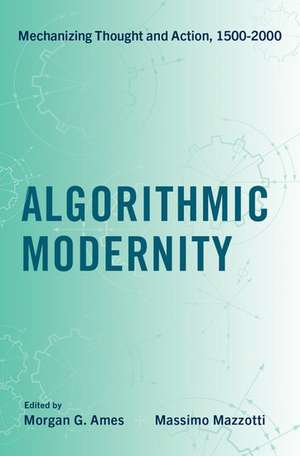Algorithmic Modernity: Mechanizing Thought and Action, 1500-2000
Editat de Morgan G. Ames, Massimo Mazzottien Limba Engleză Hardback – 12 apr 2023
Preț: 427.64 lei
Preț vechi: 503.11 lei
-15% Nou
Puncte Express: 641
Preț estimativ în valută:
81.87€ • 84.19$ • 67.92£
81.87€ • 84.19$ • 67.92£
Carte disponibilă
Livrare economică 27 ianuarie-10 februarie
Livrare express 10-16 ianuarie pentru 33.44 lei
Preluare comenzi: 021 569.72.76
Specificații
ISBN-13: 9780197502426
ISBN-10: 0197502423
Pagini: 312
Dimensiuni: 237 x 162 x 25 mm
Greutate: 0.58 kg
Editura: Oxford University Press
Colecția OUP USA
Locul publicării:New York, United States
ISBN-10: 0197502423
Pagini: 312
Dimensiuni: 237 x 162 x 25 mm
Greutate: 0.58 kg
Editura: Oxford University Press
Colecția OUP USA
Locul publicării:New York, United States
Recenzii
Algorithms are both centuries old and central to today's hopes and fears. In this compelling book, ten first-rate historians of science and mathematics trace the genealogy of algorithmic practices and ideas that play a crucial role in the modern world.
Notă biografică
Morgan G. Ames, PhD, is Assistant Professor of Practice in the School of Information and Associate Director of Research for the Center for Science, Technology, Medicine and Society at the University of California, Berkeley. Dr. Ames researches the ideological origins of inequality in the technology world, with a focus on utopianism, childhood, and learning. Her first book, The Charisma Machine: The Life, Death, and Legacy of One Laptop per Child (MIT Press, 2019), won the 2020 Best Information Science Book Award, the 2020 Sally Hacker Prize, and the 2021 Computer History Museum Prize.Massimo Mazzotti, PhD, is Thomas M. Siebel Professor of the History of Science and Director of the Center for Science, Technology, Medicine, and Society at the University of California, Berkeley. Dr. Mazzotti has published on the gendering of mathematics, mathematics and religion, Enlightenment science, and the politics of various processes of quantification, standardization, and mechanization. Hiscurrent projects explore the political dimension of mathematical reasoning in revolutionary Europe; the intersection of technology, design, and social planning in post-war Italy; and the social life of algorithms.
